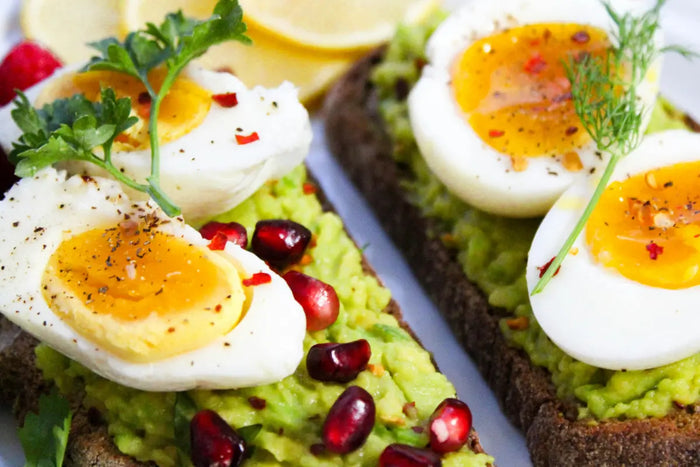Having a strong immune system is important to ensuring you stay healthy and on track to achieve your fitness goals. Glutamine, found in The Health Protein, eggs and other foods, can help to support your body's immunity and aid recovery.
Sounds good, right? Well that’s just scratching the surface. You might not know about some pretty fantastic glutamine benefits, so we wanted to clue you in. Let’s take a closer look at this important amino acid.
What is Glutamine?
Glutamine is essential in the body and makes up over 60% of muscle tissue. It was first used clinically with intensive care patients to improve recovery. Today, however, its use has been extended, and many swear by its ability to improve recovery and reduce injury risk. Who knew?
Glutamine is one of the 20 amino acids found in protein sources like eggs and meat. It's the most abundant amino acid in human tissue, and supplementation can help to support overall health and fitness. Whilst it isn’t an essential amino acid (meaning your body does produce it naturally), glutamine is especially important for those doing intense training because it can be depleted as you workout, which affects stamina, strength and recovery.
Supplementation with glutamine can also:
- Improve Protein metabolism
- Reduce muscle breakdown
The health benefits of glutamine
Glutamine is the fuel of the immune system, but levels can be depleted in our day-to-day lives, and even more so following exercise. This can suppresses the immune system and affect recovery.
The 5 key reasons people might supplement with glutamine are:
- To reduce their risk of illness
- To ensure healthy muscle development and protein synthesis
- To maintain cell hydration and speed up the healing process
- To increase growth hormone production for improved tone
- To support gut health for healthy digestion
The two most talked about benefits of glutamine are what it can do for your immune system and your gut health. Let’s take a look at each of those in more detail.
Benefits of Glutamine for immune function
Put simply, glutamine is a very important power source which fuels your immune system.
Your white blood cells fight off infections and keep you healthy, but they need glutamine in order to do a good job. Your immune system also contributes to tissue repair and regeneration but, once again, not without the help of our good friend glutamine.
As we mentioned before, our bodies do make glutamine naturally (shout out to them) but if you’re going hard in the gym or just leading a very active lifestyle, it can be possible to deplete your natural reserves a bit too quickly. That’s where diet and supplementation come in.
Benefits of glutamine for gut health
One of the other celebrated benefits of glutamine is its positive impact on gut health.
Research has shown that glutamine can positively support the gut microbiome (your gut’s own ecosystem) and modulate inflammatory responses to help cut out bloating and other related gut issues. This can not only help to keep things ticking along in the bathroom but also to protect your gastrointestinal system from damage or potential issues in the longer term.
This doesn’t just help your stomach though, it can literally change your mindset. Poor gut health can disrupt the balance of neurotransmitters which can cause conditions such as depression, and did you know around 90% of your body’s serotonin (the ‘feel good’ chemical’) is made in your gut? So it tracks that a happy gut means a happy you.
Glutamine benefits – mind, body and gut
Whatever your training goals are, recovery is essential. Glutamine can support your hard work by aiding recovery, boosting muscle growth and keeping you energized and healthy. It works to reduce muscle breakdown and support your immune system as well as keeping your gut happy – three things which are crucial to keep you in tip top shape.
If you’re looking for an easy way to keep your body topped up on glutamine, check out The Health Protein, our vegan superfood protein blend.
References
- Castell, L.M. and E.A. Newsholme. (1997).The effects of oral glutamine supplementation on athletes after prolonged, exhaustive exercise. Nutrition. 13(7-8): p. 738-42. Click here.
- Castell, L.M., J.R. Poortmans, and E.A. Newsholme. (1996). Does glutamine have a role in reducing infections in athletes? Eur J Appl Physiol Occup Physiol. 73(5): p. 488-90. Click here.
- Lacey JM, Wilmore DW. (1990). Is glutamine a conditionally essential amino acid . Nutr Rev. Click here.
- Gleeson, M. (2008). Dosing and efficacy of glutamine supplementation in human exercise and sport training. Click here.
- Brett J. Deters, Mir Saleem, The role of glutamine in supporting gut health and neuropsychiatric factors, Food Science and Human Wellness, Volume 10, Issue 2, 2021, Pages 149-154, ISSN 2213-4530. Click here.
- Bektaş A, Erdal H, Ulusoy M, Uzbay IT. Does Serotonin in the intestines make you happy? Turk J Gastroenterol. 2020 Oct;31(10):721-723. doi: 10.5152/tjg.2020.19554. PMID: 33169710; PMCID: PMC7659911. Click here.
- National Academies of Sciences, Engineering, and Medicine; Health and Medicine Division; Board on Health Sciences Policy; Forum on Regenerative Medicine; Nicholson A, Schumm SN, Beachy SH, editors. Understanding the Role of the Immune System in Improving Tissue Regeneration: Proceedings of a Workshop. Washington (DC): National Academies Press (US); 2022 Apr 21. Click here.


















